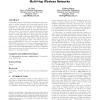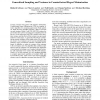206 search results - page 36 / 42 » Computing Equilibria in Anonymous Games |
113
click to vote
MOBIHOC
2008
ACM
16 years 1 months ago
2008
ACM
Channel allocation was extensively investigated in the framework of cellular networks, but it was rarely studied in the wireless ad-hoc networks, especially in the multi-hop ad-ho...
128
click to vote
IPTPS
2004
Springer
15 years 7 months ago
2004
Springer
In P2P systems, users often have many choices of peers from whom to download their data. Each user cares primarily about its own response time, which depends on how many other use...
123
click to vote
AAAI
2012
13 years 4 months ago
2012
In large extensive form games with imperfect information, Counterfactual Regret Minimization (CFR) is a popular, iterative algorithm for computing approximate Nash equilibria. Whi...
105
Voted
PODC
2010
ACM
15 years 5 months ago
2010
ACM
We quantify the effect of Bayesian ignorance by comparing the social cost obtained in a Bayesian game by agents with local views to the expected social cost of agents having glob...
HICSS
2003
IEEE
15 years 7 months ago
2003
IEEE
Social factors, such as status differences, may prevent some members from participating in group decisions. Computerized group decision support systems (GDSSs) can reduce social i...


